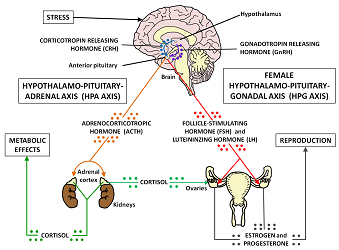







Main goal: To develop a comprehensive model of the interactions between women’s stress and reproductive physiology in natural contexts (i.e. non-clinical) across reproductive transitions and to evaluate the effects of those interactions on women’s reproductive outcomes
Background:
The pervasive effects
of stress on health and
well-being are well recognized, yet most research in this area does
not adequately account for the changes in stress physiology women
experience across reproductive phases.

The hypothalamo-pituitary-adrenal
axis (HPAA) and the female hypothalamo-pituitary-gonadal axis (HPGA). [larger
image]
© 2012 Pablo Nepomnaschy and Katrina Salvante
The neuroendocrine axes
regulating stress (hypothalamo-pituitary-adrenal
axis, HPAA) and reproduction
(hypothalamic- pituitary-gonadal axis, HPGA) are
intimately inter-connected. As
women transition between
reproductive phases the way the
HPA and HPG axes interact and
function changes. Understanding
those changes is paramount to
all studies focused on both
women’s stress and reproduction.
Presently, there is no
comprehensive longitudinal
model of women’s HPAA-HPGA
interactions in non-clinical
contexts.
Aims:
Funding:
Our
research is supported by operating grants from the Natural Sciences and Engineering Research Council of Canada
and the Canadian Institutes of Health Research,
a seed grant from the Michael Smith Foundation for Health Research - Women’s Health Research Network, a Michael Smith Foundation for Health
Research Career Investigator Scholar Award, a University of Pennsylvania PARC/PSC/Boettner Institute TRIO Pilot Project grant,
and the Human Evolutionary Studies Program at Simon Fraser University, which was supported by the Simon Fraser University Community Trust Endowment Fund.




